Search
Showing 10 of 1803 results for NARSC 2016 July student registration fees
-
New Zealand progressively reopens borders for international students in 2022 with new start in 2023
Note: The information in this story was correct at the time of publication, however, some steps in New Zealand's border reopening plan have now been brought forward. Click here to check the current border reopening steps.
Education New Zealand Manapou ki te Ao (ENZ) welcomes the Government’s announcement to reopen New Zealand’s borders. This is a positive step for international education.
The announcement outlined a five-step process for reopening borders from 28 February 2022, initially for New Zealanders to return from Australia and then from the rest of the world.
The Government also announced a fourth border class exception for up to 5,000 international students to enter New Zealand for study from mid-2022, in addition to the earlier cohorts approved in 2020 and 2021.
From October 2022 normal visa processing will resume, enabling international students to enroll for study in New Zealand in 2023.
ENZ Chief Executive Grant McPherson says today’s announcement is an important step towards rebuilding a strengthened and sustainable international education sector. “The border reopening steps outlined today enable the international education sector to progressively open through 2022 for the existing cohorts, with a new much larger cohort able to enter New Zealand for study before semester two. More details of the new student cohort will be determined by the Ministers of Education and Immigration and advised in due course.
“There's also an opportunity for students from Visa Waiver countries such as Japan and South Korea to enter New Zealand from July for short visits of up to three months.
“The Government has demonstrated their commitment to international students and educational institutions in 2023, with normal visa processing resuming in October 2022. This means international students can plan towards being in New Zealand for courses starting in 2023.”
Mr. McPherson said education providers could now plan with greater certainty for the year ahead.
“It has been an incredibly challenging period for New Zealand education providers, international students, and those who support them. The sector has shown considerable patience as the borders were carefully managed to minimize the threat posed by COVID-19. Today’s announcement is an opportunity to rebuild and reshape the sector to meet the challenges ahead.”
Mr. McPherson said the innovation and diversification into online learning and delivery of courses offshore, including pathway programmes over the last few years, would remain a feature in the industry as it moved forward. Today's announcement also prepares the way for New Zealand students to resume international studies abroad in the future.
“All New Zealand education providers know the value of building international partnerships, and developing new ways of meeting student needs. These are important building blocks for future resilience and quality education outcomes.
“In addition, from 14 March 2022 students entering New Zealand through the border exception cohorts will have the opportunity to self-isolate, rather than going through Managed Isolation and Quarantine facilities - subject to complying with all the required health and border requirements.”
Mr McPherson stressed the importance of seeking advice before moving forward with applications for enrolment. Students who have questions about this border class exception should contact their agent or preferred education provider in the first instance.
Students can also visit NauMai NZ, which provides useful information for international students in New Zealand or preparing to travel to New Zealand.
He rā ki tua – Better days are coming!
-
From the Chief Executive: Stepping up the promotion of international education
We’re about to embark on education-focussed travel that will include three of our important markets for international education – the United States, Chile and Brazil. As part of the trip, the delegation led by Education Minister Chris Hipkins will attend NAFSA, the world’s biggest international education event, held in Denver, Colorado.
This trip will also feature the launch of ENZ’s amazing new global marketing campaign on 31 May 2022 at NAFSA – there’s a sneak preview in this issue of E-News.
I’m also delighted to let you know that planning is well underway for the 29th New Zealand International Education Conference (NZIEC) to be held in August. To ensure we reach the widest possible audience at a critical time for the rebuild of the industry, NZIEC 2022 will be delivered in a virtual format this year, at no cost to attendees.
Following on from the government’s announcements earlier this month on changes to immigration settings and the restart of student visa applications from 31 July 2022, there have been two further announcements that are important for the international education sector. These relate to the outcome of recent consultation on enrolling international fee-paying students under Year 9, and a refresh of the New Zealand International Education Strategy.
International students up to Year 9
The government has decided to make no change to the ability of international students to enrol in New Zealand primary and intermediate schools. This follows earlier consultation on possible options to restrict the enrolment of international students below Year 9, which closed in March 2022.
This announcement has been widely welcomed, and demonstrates the government listened closely to feedback received from the sector and other interested parties. It’s good news that we can resume welcoming young students and groups to New Zealand schools across all age levels as our borders reopen.
New Zealand International Education Strategy (NZIES)
The existing NZIES dates back to 2018, and the impact of Covid-19 and the changed global education environment mean another look at the strategy is timely. Consultation on a refreshed NZIES 2022-2030 is underway, and I encourage you to provide your views and feedback before consultation closes on 24 June 2022.
The draft refreshed NZIES 2022-2030 reflects the government’s continued commitment to international education, and the need for us to focus on building back better from the pandemic. It includes two phases. The first phase is about rebuilding and recovery – promoting New Zealand’s education brand and supporting student recruitment. The second phase aims to build capability and investment in a more diverse and resilient international education sector.
As a package, the recent government decisions including the immigration rebalance mean we now have increased certainty about the operating environment for the international education sector. We look forward to working with you to rebuild our international education sector to be a major contributor to New Zealand. And we look forward to students from all around the world enjoying the benefits of a New Zealand education, and New Zealanders enjoying the benefits these students bring to our communities.
He rā ki tua – better times are coming.
Grant McPherson
-
Education New Zealand marks reopening of borders with new global campaign
Denver Colorado, 31 May 2022: Education New Zealand Manapou ki te Ao at the NAFSA Conference in Denver, Colorado today revealed for the first time a new global marketing campaign emphasising New Zealand’s unique attributes for international students as the country opens for business on 31 July after two years of closed borders.
Central to the campaign are the stories of eight international students from, China, Colombia, Germany, India, Japan, Thailand, USA, and Vietnam. The students share their experience of study and life in New Zealand, and the benefits that result from the weaving together of different cultures in a uniquely New Zealand way.
Education New Zealand invited the eight students to work alongside world-famous Māori fashion designer Kiri Nathan to collaborate on designing a new type of education garment that embodies the cultural values that make a New Zealand education unique: manaakitanga (care of people), kaitiakitanga (care of place), and the pōtiki spirit of youthful energy and finding a better way. The narratives in the campaign are focussed on the students’ experiences and goals, and explore themes such as work and career readiness, sustainability, and innovation through collaboration. It is a campaign authentically rooted in Te Ao Māori values.
“The traditional academic gown worn by students when they graduate is a symbol of achievement, capturing a snapshot in time,” says Ms. Nathan. “Our ‘kākahu’ (garment) symbolises not only this attainment, but most importantly the cultural journey these students have undertaken and will continue throughout their lives. Their experience in New Zealand has changed them, weaving and sharing the values of Te Ao Māori into the unique cultures of their own homeland. The final kākahu designs are a unique collaborative effort, globally-minded and inspiring – just like the students.”
Kiri Nathan is best known for her extensive experience of the modern fashion world infused with her Te Ao Māori roots. She has developed pieces for international figures including Barack Obama, Beyoncé, and the Duchess of Sussex. As a Māori mentor running the Kāhui Collective, she has seen a significant number of NZ Māori fashion designers feature at the NZ Fashion Week, Guangzhou Fashion Week, Hong Kong Fashion Week, and the Fiji fashion week. She also led a delegation to China to meet high level fashion networks and create pathways to market.
More than qualifications
At the core of the campaign is the concept that education with New Zealand is far more than the attainment of academic qualifications.
“What we offer global students is an opportunity to experience something new, different, and ongoing,” says Education New Zealand Chief Executive, Grant McPherson. “It is a new perspective that redefines success in global education beyond degrees and academic achievement and builds greater understanding of the value of continuous learning throughout life.”
“When you study with New Zealand, you’re invited to bring your whole self. You will benefit from New Zealand’s cultural values as well as our high-quality education that embodies innovation, practical learning, and preparing you for the future.”
“But we also know New Zealand benefits too. We want students to bring their stories, their culture, and their perspectives so that we can learn from each other and build a future that is connected, strong and adaptable.”
Across the eight kākahu three sustainable textile options have been used in their manufacture – upcycled commercial linen, sustainable wool from New Zealand mills, and deadstock from fabric wholesalers.
The campaign was launched as part of Education New Zealand’s participation at the NASFA 2022, the world’s largest international education conference and Expo in Denver, Colorado. The campaign will roll out across New Zealand’s key partner countries from June 2, 2022 and runs for 12 weeks initially.
The eight students:
Hanbo Wang (Kevin), from China, studying Viticulture and Wine Science at the Eastern Institute of Technology in Hawke's Bay.
Octavius Jones, from the United States of America, a PhD student in the Te Kawa a Māui department at Victoria University of Wellington. Octavius is studying digital storytelling, African and Māori studies.
Tiara Das, from India, studying Science - Psychology and Neuroscience at the University of Otago in Dunedin.
Bryann Avendaño, from Colombia, studying Civil and Natural Resources Engineering at the University of Canterbury in Christchurch.
Hanna Watanabe, from Japan, is a Year 12 High School student at Rangiora New Life School, in Rangiora, Canterbury.
Khanh Phuong LE, from Vietnam, studying Law at Waikato University, Hamilton.
Atis Suksingha, from Thailand, studying Commerce, majoring in International Business and Marketing at the University of Otago.
Malina Grube, from Germany, studying Law at the University of Auckland, Auckland.
To learn more about our new campaign, visit I AM NEW on Study with New Zealand, and watch our campaign hero video below:
YouTube -
Around the world in five – July 2022
International
New Zealand’s offshore graduates call for post-study work visa extension
NZ reveals 30 groups for PM’s scholarships
New Zealand unveils 30 groups for Prime Minister's Scholarships
Current events to have “long-term impacts” on sector
Are universities solving or accelerating the environmental crisis?
New Zealand
Institutions get ready to welcome international students
Northland education and tourism sectors await international students
Farewelling the undiplomatic diplomat
Graduation gown tells story of time in NZ
Hopes foreign student numbers back to pre-Covid levels by 2024
International students reunite with families after two-year pandemic separation
PM’s scholarships fund indigenous links
How universities are luring lucrative international students back
Canada
Exploring Indigenous cultures and societies around the world
China
China lockdowns driving study abroad interest, say stakeholders
Colombia
They held a virtual course on Culture and Society for teachers and public officials
New Zealand offers virtual courses with its best universities
Education agencies will help Colombians for their education in New Zealand
Indonesia
Girls in tech & education New Zealand facilitates education for Indonesian women
Matariki, the Maori New Year as a New Zealand’s unique celebration
Malaysia
New Zealand ready to welcome Malaysian students this August
Mexico
“Clear signs” for recruitment growth in Mexico
Nigeria
Nigerian students — which countries will give you the best shot for visa approvals?
South Korea
Thailand
Embassy of New Zealand Open House New Zealand Hybrid Bachelor's Preparation Course
New Zealand Education partners with 5 Schools in Dang Rayong to develop digital classroom projects
United Kingdom
Prime Minister signs landmark science agreement with New Zealand
Viet Nam
International students return to New Zealand from 1/8
New Zealand Future Skills Summer Camp 2022 revealed
'Study Abroad Day' brings together more than 100 global universities
Strengthening education cooperation between Vietnam and New Zealand
-
International students welcomed at Waitangi
One such welcome to acknowledge and celebrate students from around the world took place on the Waitangi Treaty Grounds on 10 August 2022.
Study Northland organised a wonderful half day programme to welcome 70 international students currently studying at Whangarei Girls High, NorthTec, Kerikeri High School and Springbank School. This included a pōwhiri, cultural performance, and a ceremony in which each student was presented with Tū Ngātahi pins and welcome certificates. They then had the opportunity to explore the history and relevance of the Treaty Grounds, and the morning ended with fish and chips in the sunshine.
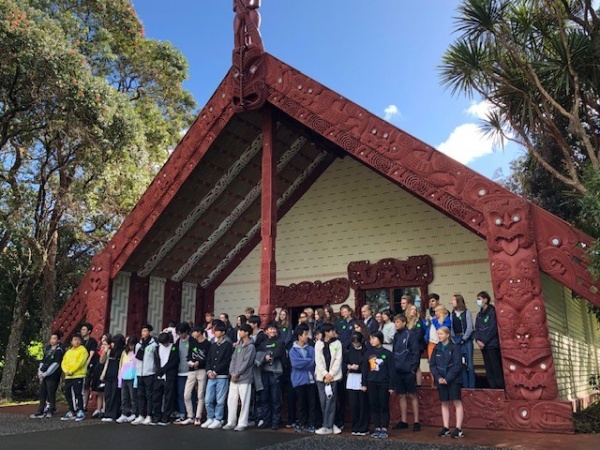
Students outside Te Wharenui at Waitangi
Tū Ngātahi is a te reo Māori phrase calling us to ‘stand together’. Education New Zealand Manapou ki te Ao developed this programme as a demonstration of welcome and support to international students, a celebration of the connection between cultures, and a recognition of the friendship and learning we share. The welcome at the Treaty Grounds was an ideal opportunity for the spirit and concept of Tū Ngātahi to be brought to life.
Ross Crossan (centre), ENZ’s Student Experience Manager, presented the students with Tū Ngātahi pins as part of the Waitangi welcome
Students were excited to be in New Zealand, some for the first time and some returning after heading back home during the pandemic.
Several of the recently arrived students at Whangarei Girls shared their first impressions with us. Fish and chips are certainly a hit, as is the chance to play badminton, volleyball, and other sports with friends. A few students mentioned the different school hours here. They also commented that just a little bit more time might be needed to get used to the weather!
Fish and chips were a highlight at Waitangi
Arisara Pungpho, from Thailand, is attending Springbank School. She has been coming to New Zealand for many years with her family. Arisara is here for six months, and says she most enjoys New Zealand’s environment, and its tranquillity and peacefulness.
“Most places in Thailand compared to New Zealand are very fast, very busy, and very lively,” Arisara says. “I also feel New Zealand is more inclusive of many cultures, which is not what I have experienced in other countries around the world.”
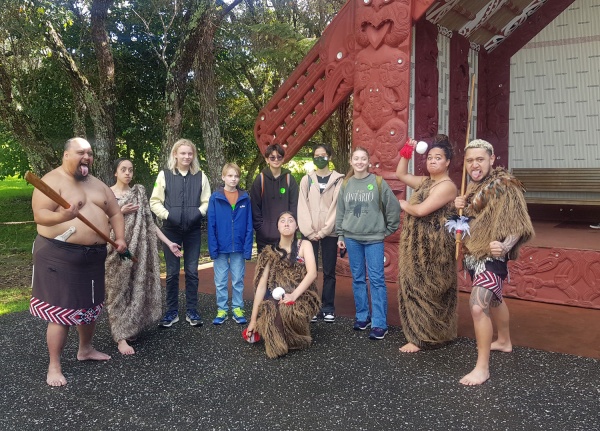
Springbank School students, including Arisara Pungpho (4th from left) and Elisabeth Ringel (3rd from left) enjoyed the cultural demonstration at Waitangi
Elisabeth Ringel particularly appreciated the warm welcome she received when she travelled here from Germany in July for a year.
“When I arrived in Auckland, I was surprised how friendly and welcoming everybody was, and how the brother of the Principal of Springbank School, with his family, drove me to my host family in Kerikeri – because my Auckland to Kerikeri flight was cancelled,” Elisabeth says.
With borders now open again, this is a significant moment for our international education sector, and we all look forward to welcoming more students to our institutions and communities over the coming months.
#TūNgātahi
Recent welcome events around the country
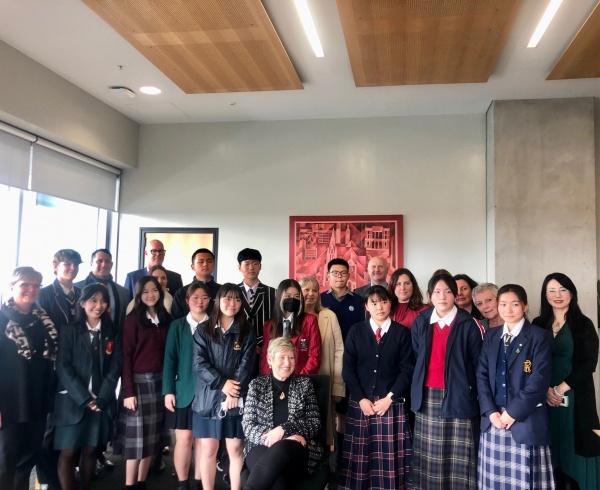
International students met with Christchurch Mayor Lianne Dalziel
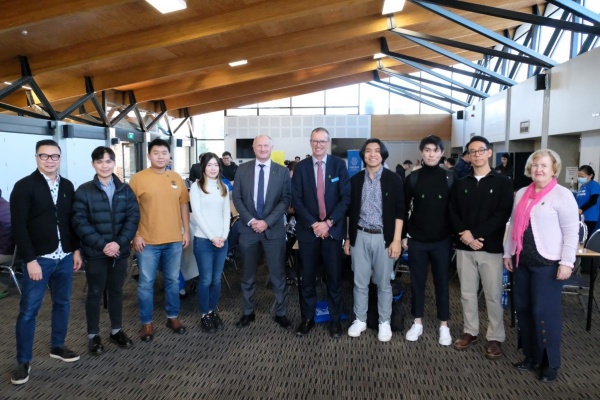
International students being welcomed to Lincoln University
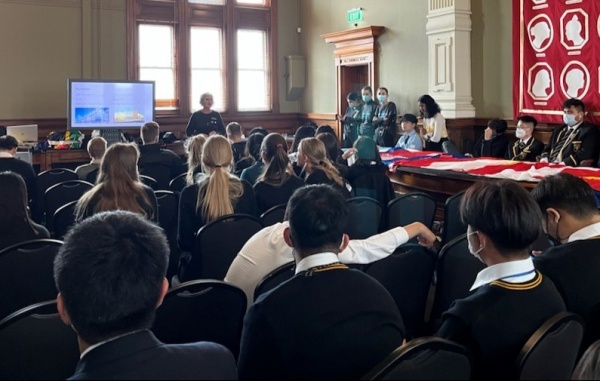
Wellington International Students' Association ran an event for over 140 international students from eight countries over the course of two days
-
New AgentLab platform launched to support education agents
Launched in early August, the new platform features a wide range of relevant information and updates to support education agents and consultants promoting study with Aotearoa New Zealand. This includes a calendar of agent-focused events and webinars, resources, and latest news and updates from across the Aotearoa New Zealand education landscape.
In 2022, Education New Zealand Manapou ki te Ao (ENZ) reviewed its agent engagement programme to ensure its offering for education agents is best placed to support the international education sector’s recovery.
ENZ commissioned Edified to research and evaluate its broad agent engagement programme as well as the ENZ Recognised Agency programme. Refreshing the AgentLab platform to offer agents a wider range of information about Aotearoa New Zealand education was among the recommendations of the Edified report.
ENZ’s Director – Sector Services, Laura Simpson, said the AgentLab platform’s refresh was guided by a need to better support all education agents, knowing the crucial role they play.
“We are developing the AgentLab platform with more tools and resources. We will continue to grow the platform to best serve all agents in their work to support students wanting to study with Aotearoa New Zealand. This helps us ensure that agents have access to accurate information, so they are best placed to drive international student recruitment and support the sector’s post-pandemic recovery.
“This is important work given our goal to grow onshore international student numbers. Rebuilding the sector to a thriving, resilient one is a major focus for Aotearoa New Zealand. We know that the relationship between education providers and agents is the primary one. So our job, set out clearly in Focus Area One of the International Education Strategy, is to make sure we support high-quality education agents in recruiting students to Aotearoa New Zealand and supporting the sector’s recovery,” Laura said.
The new AgentLab platform is hosted at the same address as the old site at agentlab.enz.govt.nz. It is easily accessed through the single sign-on, MaiENZ portal through which ENZ offers all its digital services to Aotearoa New Zealand’s international education sector. Existing AgentLab users will be able to seamlessly access the new site with their current MaiENZ logins.
The discontinuation of the ENZ Recognised Agencies (ENZRA) programme that was announced to the sector and education agents in July was also an outcome of the agent engagement review. All education agents – including former ENZRA agents – will be able to access the same level of information and resources via the AgentLab platform. The discontinuation of the ENZRA programme will not affect this.
-
From the CE: 12 months on from the borders reopening
Kia ora tātou,
Twelve months ago, New Zealand’s borders reopened to international students. From a standing start the international education sector has, alongside Education New Zealand Manapou ki te Ao (ENZ) and our New Zealand Inc partners in government, worked enormously hard.
The first challenge was to get New Zealand back “on the map” as a high-quality international education destination. One of our ENZ teams tells me that we were involved in a minimum of 27 events including NAFSA, ANZA, EAIE, agent and student fairs over the last 12 months. There have been at least 11 senior ministerial and sector delegations covering China, India, Viet Nam, Japan, South Korea, US, Canada, Chile, Brazil, and Thailand. This is only the tip of the iceberg of all the effort expended by New Zealand providers, with our partner agents, providers and Government agencies – offshore and onshore.
And as students started to apply for their visas and arrive in New Zealand, we cannot underestimate the amount of effort that has been required to get the infrastructure that supports the sector up and running. Reviewing applications, delivering offers of place, processing visas, finding accommodation, pastoral care; the list goes on. Lots of unseen and unheralded effort that goes on behind the scenes to ensure international students receive a high-quality experience.
Yet this is just one part of what we do. Onshore and offshore, the sector has also supported the Prime Minister’s and Manaaki Scholarships, and worked closely with ENZ to explore opportunities to innovate and make the sector more resilient.
It isn’t easy and while we all know that there is more to do on all fronts, it is worth taking a moment to acknowledge just what has been achieved together.
Turning our attention to the next 12 months, in June the ENZ Board approved our business plan for this financial year (1 July 2023 to 30 June 2024). The plan has four clear priorities:
- Grow inbound student mobility for Aotearoa New Zealand
- Support sector capability development
- Build global connections
- Encourage and support innovation in the sector
Within these priorities, close to 75% of our discretionary budget is focused on the first one. This is completely aligned with Focus Area 1 of the New Zealand International Education Strategy, which is to help providers of international education to build back onshore offerings. We know there is more to do and over the next 12 months the priority is to build on the good start we have made and cement the recovery and rebuilding of the sector.
That’s not to say we aren’t investing in the other areas; we are. We will continue to build global connections. These connections go hand-in-hand with our first priority and in some countries, they are essential to achieving it.
We will also build on the lessons of the past 12 months around innovation. In the first week of August, we organised a series of events facilitated by Professor Martin Bean, a recognised leader in discussions around the future of education. His brief was to provoke and encourage discussion on what the future could look like and what it might take to get there. You can read more about his visit in our E-News story here.
And when it comes to building sector capability this week’s NEW ZEALAND INTERNATIONAL EDUCATION CONFERENCE KI TUA is an immediate opportunity to listen, learn, discuss, contribute, and network with specialists and colleagues. It will be great to be able to meet in person for the first time in close to three years and to celebrate the 30th time that we have joined together as a sector. I look forward to meeting and talking with many of you over the next few days.
Mauri tū, mauri ora, an active soul is a healthy soul.
Ngā mihi
Grant
-
New Zealand institutions strengthen ties with Latin American education agencies
In April, ENZ supported the Study in New Zealand Agent Seminars – an event series organised by Kiwi EdLink, a New Zealand-based organisation that represents education providers across the country.
New Zealand’s educations offerings for Latin American students were showcased to education agents at the seminars. From English language programmes for children, youth, and adults to short or long-term school studies in New Zealand.
The participating institutions from New Zealand were the Kiwi English Academy, Glendowie College and Onslow College.
ENZ teams in Santiago and São Paulo hosted networking events at the New Zealand Embassy in Chile and the Consulate in Brazil, inviting selected agents aligned with Kiwi EdLink’s strategic goals in the region.
In addition to facilitating these connections, the ENZ team also provided market insights and engaged in conversations about future steps to deepen engagement and opportunities in Latin America’s dynamic education landscape.
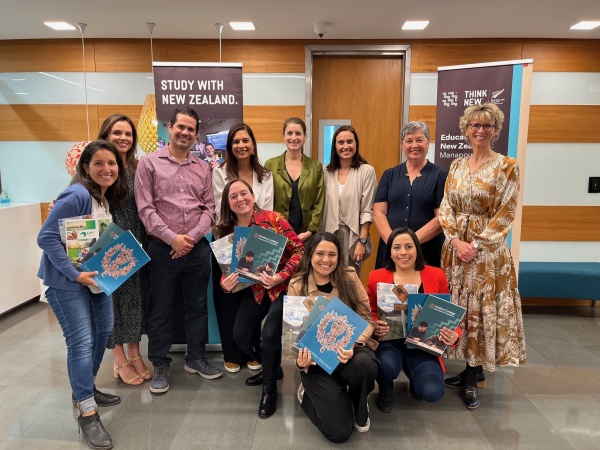
Attendees of the Study in New Zealand seminar in Santiago, Chile. This event was hosted at the New Zealand Embassy.
During the event in São Paulo, Director of Kiwi English Academy, Kathryn Herbert, said “This is a moment to reconnect with our Latin American partners so we can better understand how to offer relevant programs to Brazilian students.”
The feedback from sector attendees was positive. Director of International Students at Onslow College, Robynne Bloemstein, said that the institution is very excited to reengage with the Latin American market and welcome students from the region into its student body, which already includes 45 international students.
It was the first visit to Brazil for the Director of International Students at Glendowie College, Rebecca Johnstone. She said “We love Latin American students—we currently have 47 international students in total, including two Chilean students and a new Brazilian student starting in July. They all contribute greatly to the multicultural environment of our school.”
Check out the video report the ENZ team put together with the representatives of New Zealand schools at the São Paulo event.
-
Wellington International Students Excellence Awards showcase the value of international education
Established in 2016, the Wellington International Student Excellence Awards, held by WellingtonNZ, recognise high-achieving international students based in the Wellington region.
Awardees included Academic Excellence Award winner and Whitireia NZ/WelTec student Matthew Hitchener from England, who was honoured for his project introducing pelvic binders to paramedic services in Wellington. Pelvic binders are commonly used overseas to compress the pelvis to prevent bleeding in those with a pelvic fracture. After a successful trial on a LifeFlight helicopter, the binders will soon be launched on all Wellington Free Ambulances.
WellingtonNZ Workforce and Business Growth Manager, Matt Carrere, says the awards show both what the Wellington region can offer international students, as well as the vast contribution students make to the region in return.
“Wellington is an interconnected, social and diverse region where international students learn and thrive. It’s unsurprising that many choose to remain here after their studies to pursue a career.”
The awards also recognised individuals and organisations that work to welcome international students to the region.
PhD candidate at Victoria University of Wellington, Anna-Marie White, received the Internationalisation Award – Domestic Student for organising regular PhD writing workshops (or ‘bootcamps’) with international students.
She was nominated by a group of PhD candidates from around the world, who said: “Anna has expressed her manaakitanga to her international friends and has increased our feeling of home, our love of New Zealand, and our passion for our research. Bootcamp will always be the highlight of our PhD studies, and Anna is a member of the Wellington community that you can be incredibly proud of.”
This year’s Internationalisation Workplace Award went to Wellington tech company MarginFuel for offering employment and internships to 20 international students and graduates.
“MarginFuel offers the students opportunities to further their careers, and in return we have found the students are intelligent, hard-working and add a rich layer to our team culture,” CEO Andrew Pascoe says. “New hires especially comment on how culturally diverse we are, and how this adds so much to the organisation.”
For the full list of winners, visit the WellingtonNZ website.
-
International education is a win:win for NZ communities and visiting students
· 84 percent of international students studying in New Zealand rate their overall experience positively.
· 75 percent of New Zealanders believe that international students benefit New Zealand.
International education is delivering for both the international students and the New Zealand communities in which they study and live. These are the key findings of two research projects to measure the student experience and the views New Zealanders hold towards international education which have just been released by Education New Zealand Manapou ki te Ao (ENZ). ENZ is the New Zealand government agency focused on international education.
Student experience in New Zealand
In the 2023 International Student Experience survey of 4,755 international students from more than 70 nationalities, 84 percent rated their overall experience positively, while another 83 percent said they would recommend New Zealand as a study destination.
Students were most positive about their personal development and outcomes, with 87 percent saying the experience helping encourage their curiosity and develop new ideas. Students were also very positive (88 percent) about the people and connections they made in New Zealand.
New Zealand was the first choice of study destination of 78 percent of respondents and 64 percent said their New Zealand experience had met or exceeded their expectations, which is consistent with previous research.
Commenting on the results, ENZ General Manager for Marketing and Communications Geoff Bilbrough, said the results showed that New Zealand’s ability to deliver a quality education to international students had remained strong through the recent pandemic, and augured well for further recovery of the sector.
“The strong preference of students for New Zealand as a place where they can obtain a high quality education while enjoying unique personal development and learning experiences really shone through in the student experience survey.”
"The fact that 83 percent would recommend New Zealand based on their personal experience is also very positive, because they will share their experience with friends and families. This word-of-mouth testimony builds resilience for New Zealand as an international education destination.”
Local benefits
In an ENZ survey of 1,100 New Zealanders conducted in December last year, 75 percent of respondents believe that international students benefit New Zealand.
The Ipsos Fast Facts survey, which drew responses from all regions of the country, saw 80 percent of respondents highlighting economic benefits, particularly in local communities, as a key reason for their positive view. Local and cultural contributions were also noted with 81 percent saying international students help local students learn about other cultures and ways of living, and contribute to New Zealand’s cultural diversity.
The results of the 2023 survey highlighted the continuing growth in support for international students and their positive impact on New Zealand since 2016 when only 57 percent believed international students helped the New Zealand economy and economic growth.
The proportion of New Zealanders who feel that international students make it harder for New Zealanders to get jobs also decreased from 34 percent in 2018 to 24 percent in 2023.
However, some respondents expressed concern that some international students use the New Zealand education system as a means to residency, while 32 percent felt New Zealand’s infrastructure in housing, transport and medical services is not well equipped to allow for international students.
Mr Bilbrough said the positive result from the domestic survey was also good news.
“International students have always been a significant contributor to regional economies. It is particularly pleasing that there is strong awareness and support of the cultural exchanges that happen when international students learn alongside New Zealand students and participate in our communities. While the research identified some challenges, the definite trend in awareness of the benefits international students bring to New Zealand is very positive for the future.”
For further information:
Sai Raje | Senior Communications Advisor, Education New Zealand
+64 21 479 649
Notes to Editors:
About Education New Zealand (ENZ) https://www.enz.govt.nz/
Education New Zealand Manapou ki te Ao (ENZ) is the government agency responsible for taking New Zealand’s education experiences to the world. ENZ promotes a New Zealand education as one that teaches students to be critical thinkers, problem solvers and lifelong learners, which will help them succeed in their future careers and create a positive impact on the world.
With approximately 100 staff in 18 locations around the world, ENZ works closely with New Zealand’s diverse education sector including schools, English language providers, Private Training Establishments, Te Pūkenga (Institutes of Technology and Polytechnics), universities; and internationally with NZ Inc agencies, Government agencies and education providers to encourage sustainable growth and identify opportunities.

